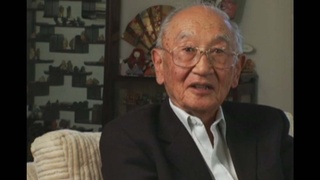Interviews
Interned at age fifteen, I saw camp as an adventure
At fifteen, I think the thing was more of an adventure. I think that different people at different ages had different reactions, but for me at fifteen, it was sort of an adventure. What was going to happen next? [At] fifteen you know you’re invincible. You could do anything, so . . . I don’t recall any negative experience, at least initially. I think that set in later. No one realized that there would be no school until—well we didn’t know, but there was no school until the fall, but we were right in the middle of school. So that left a big void. And of course, there wasn’t really anything to do. That was one of the biggest problems.
Date: June 12, 1998
Location: California, US
Interviewer: Darcie Iki, Mitchell Maki
Contributed by: Watase Media Arts Center, Japanese American National Museum
Explore More Videos

Appearance vs. Combat Effectiveness
(1919 - 2006) World War II and Korean War veteran

Would do the same again
(1916-2010) draft resister, helped form the Heart Mountain Fair Play Committee


A visit to Jerome after OCS
(1919 - 2006) World War II and Korean War veteran




General Ryder’s faith in the 100th infantry battalion
(1919 - 2006) World War II and Korean War veteran


Lost respect for the flag after incarceration
(1913-2013) Doctor specializing in obstetrics in Southern California

Traumatic experiences before camp
(1913-2013) Doctor specializing in obstetrics in Southern California

Joining the hospital unit in Santa Anita Race Track
(1913-2013) Doctor specializing in obstetrics in Southern California

“Everybody went in like sheep”
(1913-2013) Doctor specializing in obstetrics in Southern California

The horror of Hiroshima after the atomic bombing (Japanese)
(1928 - 2008) Drafted into both the Japanese Imperial Army and the U.S. Army.

Finding out Roosevelt wanted Japan to attack
(1919-2020) Member of the 1800th Engineering Battalion. Promoted Japan-U.S. trade while working for Honda's export division.
